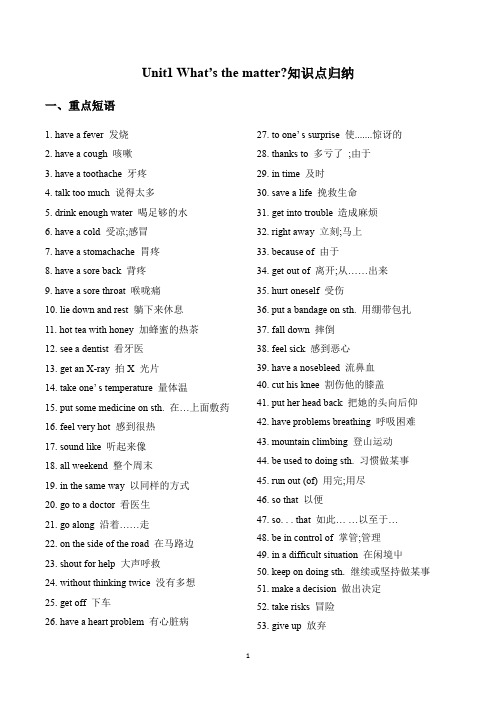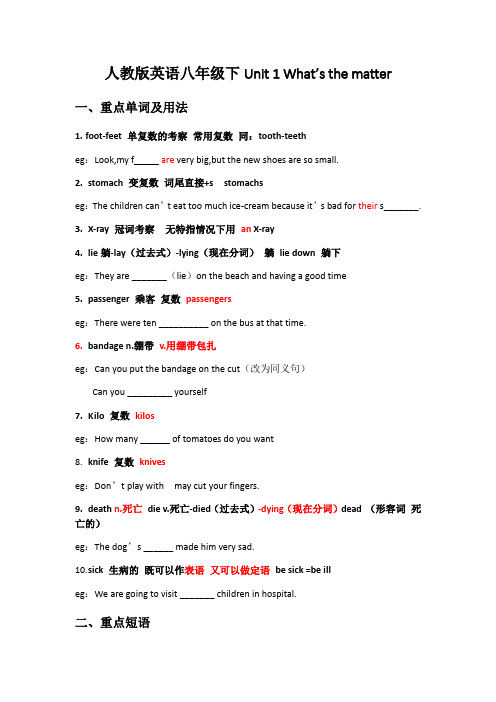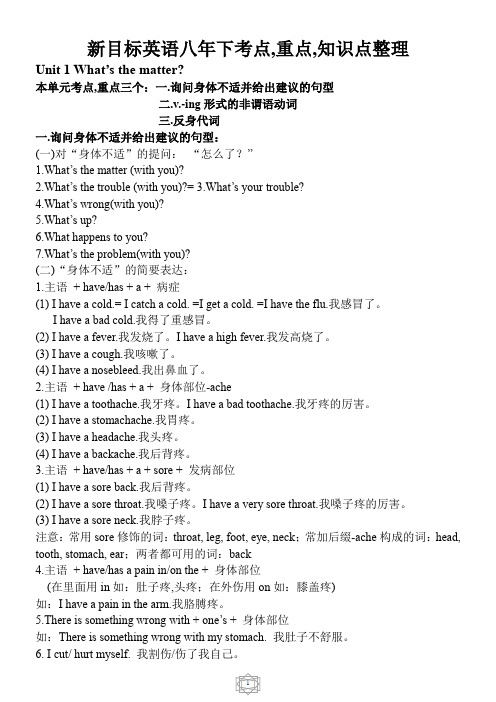人教版八年级下Uuit One知识点详讲
人教版初二(下)英语unit1 what's the matter知识点讲解与练习

八年级下册英语Unit 1 what’s the matter?词汇篇学生通过本讲学习,能够掌握本单元的重点词汇句型,并在综合能力上有一定的拓展。
1.matter的用法(1)名词:事情,问题What’s the matter? =what’s wrong (with you)? =what’s the trouble怎么啦?出什么事啦?(2)动词:有重大影响,有重要性如:What does it matter?2.疾病的表达法have a cold/a fever/ a toothache/ a stomachache3.take 的固定搭配take one’s temperature/ take breaks/ take risks/take some medicine/take off/ take care of/take away 4.surprise的用法1.做名词:to one’s surprise 使。
惊讶的,出乎。
意料2.做动词:surprise sb使某人吃惊3.做形容词:surprising, surprised的用法5.get的用法get off下车/get on上车/get into陷入,参与6.be used to sth/doing sth 习惯于做某事be used to do sth 被用作去做某事used to do sth 习惯于做某事7.out of的固定搭配look out of 向。
外看/ get out of从。
出来/ run out of用光基础演练1.---What’s wrong ______you?---I fell off the bike and hurt my leg.A. ofB. withC. forD. by2.Tom and Jenny enjoyed _________playing computer games.A. himselfB. herselfC. ourselvesD. themselves3. Sally became interested ___________science and wanted to be a scientist.A. forB. inC. throughD. at4. ---I had a __________.---You’d better go to see a dentist.A. headacheB. feverC. coldD. toothache5. I didn’t _________my temperature, but I knew I had a fever.A. giveB. setC. takeD. show二、根据汉语意思翻译句子。
最全面人教版八年级下册英语第一单元知识点归纳总结

Unit 1 What's the matter?一、词汇与短语◆重点单词A部分1.matter n. 问题;事情2.sore adj. 疼痛的;酸痛的3.stomachache n. 胃痛;腹痛4.foot n. 脚;足5.neck n. 颈;脖子6.stomach n. 胃;腹部7.throat n. 咽喉;喉咙8.hurt v. (使)疼痛;受伤9.fever n. 发烧10.passenger n. 乘客;旅客11.lie v. 躺;平躺12.break n. 间歇;休息13.rest v. &n. 放松;休息14.onto prep. 向;朝15.X-ray n. X射线;X光16.trouble n. 问题;苦恼17.toothache n. 牙痛18.hit n. (用手或器具)击;打19.headache n. 头痛20.herself pron. (she的反身代词)她自己21.off adv. & prep. 离开(某处);不工作;从……去掉B部分1.bandage n. 绷带v. 用绷带包扎2.press v. 压;挤;按3.sick adj. 生病的;有病的4.knee n. 膝;膝盖5.breathe v. 呼吸6.knife n. 刀7.sunburned adj. 晒伤的8.blood n. 血9.ourselves pron. (we反身代词)我们自己10.mean v. 意思是;打算11.climber n. 登山者;攀登者12.importance n. 重要性;重要13.risk n.&v. 危险;风险;冒险14.decision n. 决定;抉择15.accident n.(交通)事故;意外遭遇16.control v.&n. 限制;约束;管理17.situation n. 情况;状况18.spirit n. 勇气;意志19.kilo( = kilogram) n. 千克;公斤20.death n. 死;死亡21.rock n. 岩石22.nurse n. 护士◆重点短语A部分1.have a cold 感冒2.lie down 躺下3.have a stomachache 胃痛4.take one's temperature 量体温5.have a fever 发烧6.to one's surprise 使……惊讶的是7.get off 下车8.right away 立即;马上9.take breaks (take a break) 休息10.talk too much 说得太多11.drink enough water 喝足够的水12.have a very sore throat 嗓子非常疼13.get an X-ray 拍X光片14.see a dentist 看牙医15.drink some hot tea with honey 喝一些加蜂蜜的热茶16.put some medicine on sth.在……上面敷一些药17.feel very hot 感到很热18.sound like 听起来像19.all weekend 整个周末20.in the same way 以同样的方式21.go to a doctor 看医生22.go along 沿着……走23.on the side of the road 在马路边24.shout for help 大声呼救25.without thinking twice 没有多想26.have a heart problem 有心脏病27.thanks to 多亏了;由于28.in time 及时29.save a life 挽救生命30.get into trouble 陷入麻烦31.hurt oneself 受伤32.fall down落下;摔倒B部分1.be used to 习惯于……;适应于……2.in a difficult situation 在困境中3.take risks (take a risk) 冒险4.keep on doing sth. 继续(或坚持)做某事5.run out (of) 用尽;耗尽6.make a decision 作出决定7.cut off 切除8.get hit on the head 撞到头部9.get out of 离开;从……岀来10.be interested in 对……感兴趣11.give up 放弃12.mean doing sth. 意味着做某事13.put a bandage on sth. 用绷带包扎…14.lose one's life 失去生命15.feel sick 感到恶心16.mountain climbing 登山运动17.have problems breathing 呼吸困难18.be in control of 掌管;管理◆重点句子A部分1.What's the matter with you?=What's the trouble with you?=What's wrong with you?你怎么了?2.What should she do? 她该怎么办呢?3.Did you fall down? 你跌倒了吗?4.Should I take my temperature? 我应该量一下体温吗?5.I think I sat in the same way for too long without moving.我想我以同样的姿势一动不动地坐得太久了。
人教版八年级英语下册Unit1知识点归纳

Unit1 What’s the matter?知识点归纳一、重点短语1. have a fever 发烧2. have a cough 咳嗽3. have a toothache 牙疼4. talk too much 说得太多5. drink enough water 喝足够的水6. have a cold 受凉;感冒7. have a stomachache 胃疼8. have a sore back 背疼9. have a sore throat 喉咙痛10. lie down and rest 躺下来休息11. hot tea with honey 加蜂蜜的热茶12. see a dentist 看牙医13. get an X-ray 拍X 光片14. take one’ s temperature 量体温15. put some medicine on sth. 在…上面敷药16. feel very hot 感到很热17. sound like 听起来像18. all weekend 整个周末19. in the same way 以同样的方式20. go to a doctor 看医生21. go along 沿着……走22. on the side of the road 在马路边23. shout for help 大声呼救24. without thinking twice 没有多想25. get off 下车26. have a heart problem 有心脏病27. to one’ s surprise 使.......惊讶的28. thanks to 多亏了;由于29. in time 及时30. save a life 挽救生命31. get into trouble 造成麻烦32. right away 立刻;马上33. because of 由于34. get out of 离开;从……出来35. hurt oneself 受伤36. put a bandage on sth. 用绷带包扎37. fall down 摔倒38. feel sick 感到恶心39. have a nosebleed 流鼻血40. cut his knee 割伤他的膝盖41. put her head back 把她的头向后仰42. have problems breathing 呼吸困难43. mountain climbing 登山运动44. be used to doing sth. 习惯做某事45. run out (of) 用完;用尽46. so that 以便47. so. . . that 如此… …以至于…48. be in control of 掌管;管理49. in a difficult situation 在闲境屮50. keep on doing sth. 继续或坚持做某事51. make a decision 做出决定52. take risks 冒险53. give up 放弃二、用法归纳1.need to do sth.需要去做某事2.see sb. doing sth.看见某人正在做某事3.ask sb. sth.询问某人某事4.expect sb. to do sth.期望某人做某事5.agree to do sth.同意做某事6.help sb. ( to ) do sth.帮助某人做某事7.want to do sth.想要做某事8.tell sb. To do sth.告诉某人做某事9.have problems (in) doing sth.做某事有困难e sth. To do sth. 用某物去做某事11.be/get used to doing sth.习惯于做某事12.seem to do sth.好像做某事13.keep on doing sth.继续做某事14.mind doing sth.介意做某事三、重点句型1. What’ s the matter? 你怎么了?What’ s the matter with you? = What’s the trouble with you? = What’ s wrong with you?2. What should she do? 她该怎么办呢?Should I take my temperature? 我应该量一下体温吗?主语+ should/shouldn’t + 动词原形. ..①You should lie down and rest.你应该躺下休息一会儿。
人教版八年级英语下册Unit 1知识点

人教版八年级英语下册Unit 1知识点人教版八年级英语下册Unit 1知识点Unit 1 Will people have robots?重点语法:一般将来时态的应用do/does 的一般将来时态形式:(shall/will) dodo/does 的一般将来时态的被动语态:(shall/will)be done一般将来时态的肯定句、否定句、疑问句形式:肯定句例句:People will have robots in a few years.否定句例句:People (will not/won't) have robots in a few years.一般疑问句例句:Will people have robots in a few years?特殊疑问句例句:What will people have in a few years?重点短语:won't = will notthey'llwillshe'll = she willhe'll = he willI'll = I willfall in love with(sb./sth.)爱上(某人/某物)be able to do sth. 能够做某事come true 实现uture 未来hundreds of 数以百计的thousands of 数以千计的look for(sb./sth.)寻找(某人/某物)will → would 情态动词 will 的原形和过去式may → might 情态动词 may 的原形和过去式Reading Strategy(阅读方法)Look ale and picture, and predict what you will read about. (看着标题和图片,预知你要阅读那些方面的内容。
)This helps you get ready to acquire new information. (这样可以帮助你获得一些新的信息。
最新人教版八年级下册英语第一单元知识点

人教版英语八年级下Unit 1 What’s the matter一、重点单词及用法1.foot-feet 单复数的考察常用复数同:tooth-teetheg:Look,my f_____ are very big,but the new shoes are so small.2.stomach 变复数词尾直接+s stomachseg:The children can’t eat too much ice-cream because it’s bad for their s_______.3.X-ray 冠词考察无特指情况下用an X-ray4.lie躺-lay(过去式)-lying(现在分词)躺lie down 躺下eg:They are _______(lie)on the beach and having a good time5.passenger 乘客复数passengerseg:There were ten __________ on the bus at that time.6.bandage n.绷带v.用绷带包扎eg:Can you put the bandage on the cut(改为同义句)Can you _________ yourself7.Kilo 复数kiloseg:How many ______ of tomatoes do you want8.knife 复数kniveseg:Don’t play with may cut your fingers.9.death n.死亡die v.死亡-died(过去式)-dying(现在分词)dead (形容词死亡的)eg:The dog’s ______ made him very sad.10.s ick 生病的既可以作表语又可以做定语be sick =be illeg:We are going to visit _______ children in hospital.二、重点短语have a cold =catch a cold =have the flu 感冒cough 咳嗽lie down 躺下take one’s temperature 量体温have a fever 发烧take/have breaks/a break 休息=take/have a rest get off 下车-get on上车to one’s surprise 令某人惊讶的是right away 立刻马上=right now get into (trouble)陷入(麻烦)get sunburned 被晒伤be used to (doing)习惯于适应于...... take risks/a risk 去冒险run out (of)用完用尽cut off 切除get out of 离开从......出来be in control of 掌管管理give up (doing)放弃(做)某事have a stomachache 胃痛get an X-ray 做一个X射线检查thanks to......由于多亏in time 及时on time 准时think about 考虑think of认为fall down 摔倒make a decision 作决定put......on......把....放在...上be interested in 对...感兴趣三、用法总结1.need to do sth需要做某事eg: The teacher needs_____(rest) for a few minutes.like 意为“听起来像”后接n./adj./句子eg: It sounds like a good idea.类似的感官动词+like:feel like/smell like/ look like/taste like/seem likesound+adj. 结构中,sound 是系动词意为“听起来是”后接形容词eg:That sounds great.+n./doing(v.现在分词)He went to school without having breakfast. eg:He left the classroom without ________ anythingv.同意,赞成agree with sb/某人的意见看法Does she agree with usagree to do sth 同意做某事They agreed to solve the problem. problems (in) doing sth做某事有困难=have trouble/difficulty (in) doinghave problems with sth =have trouble/difficulty with sth 在某方面有困难eg:One of my good friends said he had problems__________(learn) English.get used to doing sth 习惯于做某事eg:He used to get up late,but now he is used to getting up early.used to do sth 过去常常做某事(现在不做了)eg:He used to read English in the evening.use sth to do sth 使用用某物做某事eg:So he used knife to cut off his arm.be used to do sth 被动被用于做某事eg:These new pens are used to paint the wall.one’s life 丧失生命save one’s life 挽救某人的生命eg:He lost his life in the car accident.adj.足够的充足的后接名词n. enough moneyadv.足够地修饰形容词/副词enough要后置eg:The book is_______,but I don’t have enough money ______it.interesting; to buy enough; to buyenough; buying interesting; buying9. the importance of (doing)sth (做)某事的重要性important adj.重要的unimportant adj.不重要的importance n.重要性eg:We students should know the importance of (learning)English.n.决定make a decision (to do sth)decide to do sth 决定做某事decide not to do sth 决定不做某事eg:Tom made a decision to study English well.up 放弃give up 是动词+副词结构接代词作宾语时代词放中间eg:The problem is so difficult for you,but don’t _______A.give it up it out up it out itgive up doing sth 放弃做某事eg:You will be very sad if you give up______(sing).用法keep on doing sth 继续做某事(中间有间隔强调重复性)eg:He kept on studying though he was very tired.keep doing sth 继续不停地做某事(不间断连续性)eg:Keep walking until you reach the end of the road.keep sb doing 让某人一直做某事eg:Don’t keep the other students waiting.keep sb from doing sth 阻止某人做某事eg:We should keep the little boy from stepping on the grass.用法find找到,强调寻找的结果look for强调寻找过程find out找出查明eg:I was looking for my watch,but I didn’t find it.find sb doing sth 发现某人正在做某事eg:When I walked along the road,I found an old man shouting for help.find it +adj形容词+to do sth 发现做某事是...的eg:She found it hard to finish the work by herself.risks=take a risk 冒险He likes taking risks.risk one’s life to do 冒着生命危险去做某事eg:He risked his life to save the child.risk doing stheg: The man called Tom often risks flying over the sea.四、短语辨析1.see sb doing sth 看见某人正在做某事(动作正在发生)see sb do sth 看见某人做某事(看到动作全过程或者经常看到动作发生)eg:I saw the boy crying when I passed by(路过).类似的hear/watch/notice/find+sb do/doing sththanks to 多亏... 由于....=with the help of/with one’s help=because ofthanks for 因.......而感谢强调感谢的原因eg:Thanks to my teacher ,I passed the exam.Thanks for your help .Thanks for inviting me.2.in time 及时表示动作在规定时间内或比规定时间提前发生on time 准时按时指正好在规定时间内eg:Thanks for coming here to help me in time.The train arrived into the station on time.火车准时进站了。
人教版八年级下册Unit1知识梳理

Unit1 知识梳理【重点单词】matter [ˈmætə] v. 重要,要紧,有关系What’s the matter? 怎么了?出什么事了?sore [sɔ:(r)] adj. 疼痛的,酸痛的have a cold 感冒stomach ['stʌmək] n. 胃,腹部stomachache ['stʌməkeɪk] n. 胃痛,腹痛have a stomachache 胃痛foot(复数feet) [fu:t] n. 脚neck [nek] n. 颈,脖子throat [θrəʊt] n. 喉咙fever ['fi:və] n. 发烧,发热lie [laɪ] v. 躺,平躺lie down 躺下rest [rest] n. 剩余部分,其余;放松,休息cough [kɒf] n. & v. 咳嗽X-ray ['eksreɪ] n. X光,X射线toothache [ˈtu:θeɪk] n. 牙痛take one's temperature 量体温headache [ˈhedeɪk] n. 头痛have a fever 发烧break [breɪk] n. & v. 休息,暂停;打破take breaks (take a break)休息hurt [hə:t] v. 伤害,损害,使受伤passenger ['pæsɪndʒə] n. 乘客,旅客off [ɒf] adv. prep. 离开(某处);从…去掉get off 下车to one's surprise 使…惊讶,出乎…意料onto [ˈɒntə] prep. 向,朝trouble [ˈtrʌbl] n. 麻烦,烦扰,问题hit [hit] n. & v. 碰撞,打,打击right away 立即,马上get into 陷入,参与herself [hə:ˈself] pron. 她自己,她本身(she的反身代词)bandage ['bændɪdʒ] n. & v. 绷带;用绷带包扎sick [sɪk] adj. 患病的,不适的knee [ni:] n. 膝盖nosebleed [ˈnəʊzbli:d] n. 鼻出血breathe [bri:ð] v. 呼吸sunburned [ˈsʌnbɜ:nd] adj. 晒伤的ourselves [ɑ:ˈselvz] pron. 我们自己(we的反身代词)climber [ˈklaɪmə(r)] n. 登山者be used to 习惯于… 适应于…risk [rɪsk] n. & v. 风险,危险;冒险take risks (take a risk) 冒险accident [ˈæksidənt] n. 意外事件;事故situation [ˌsitjuˈeiʃən] n. 状况,形式,情况kg=kilogram [ˈkɪləgræm] n. 公斤,千克rock [rɔk] n. 岩石run out (of) 用尽,耗尽knife [naif] n. 刀,餐刀cut off 切除blood [blʌd] n. 血mean [mi:n] v. 意味着,意思是,意欲get out of 离开,从… 出来importance [ɪmˈpɔ:tns] n. 重要性decision [dɪ'sɪʒn] n. 决心,决定,抉择control [kən'trəʊl] v. 控制,支配,操纵be in control of 掌管,管理spirit ['spɪrɪt] n. 勇气,意志death [deθ] n. 死亡give up 放弃nurse [nə:s] n. 护士【重点短语】1.have a fever 发烧2.have a cough 咳嗽3.have a toothache 牙疼4.talk too much 说得太多5.drink enough water 喝足够的水6.have a cold 受凉;感冒7.have a stomachache 胃疼8.have a sore back 背疼9.have a sore throat 喉咙痛10. take risks 冒险11.hot tea with honey 加蜂蜜的热茶12.see a dentist 看牙医13.get an X-ray 拍X 光片14.take one’ s temperature 量体温15.put some medicine on sth. 在……上面敷药16. give up 放弃17. sound like 听起来像18. all weekend 整个周末19. in the same way 以同样的方式21. go along 沿着……走22. on the side of the road 在马路边23. shout for help 大声呼救24. without thinking twice 没有多想25. get off 下车26. have a heart problem 有心脏病27. to one’ s surprise 另某人惊讶的是28. thanks to 多亏了;由于29. in time 及时30. make a decision 做出决定31. get into trouble 造成麻烦32. right away 立刻;马上33. because of 由于34. get out of 离开;从……出来35. keep on doing sth. 继续或坚持做某事36. put a bandage on sth. 用绷带包扎37. fall down 摔倒38. feel sick 感到恶心39. have a nosebleed 流鼻血40. cut his knee 割伤他的膝盖41. put her head back 把她的头向后仰42. have problems breathing 呼吸困难43. mountain climbing 登山运动44. be used to doing sth. 习惯做某事45. run out (of) 用完;用尽46. so that 以便47. so...that... 如此……以至于...…48. be in control of 掌管;管理49. in a difficult situation 在闲境中【重点句型】1. What's the matter with you?= What'the trouble with you?= What's wrong with you? 你怎么了?2. What should she do? 她该怎么办呢?3.Should I take my temperature? 我应该量一下体温吗?4.You should lie down and rest. 你应该躺下休息一会儿。
人教版英语八年下学期 Unit1考点重点知识点作文整理

新目标英语八年下考点,重点,知识点整理Unit 1 What’s the matter?本单元考点,重点三个:一.询问身体不适并给出建议的句型二.v.-ing形式的非谓语动词三.反身代词一.询问身体不适并给出建议的句型:(一)对“身体不适”的提问:“怎么了?”1.What’s the matter (with you)?2.What’s the trouble (with you)?=3.What’s your trouble?4.What’s wrong(with you)?5.What’s up?6.What happens to you?7.What’s the problem(with you)?(二)“身体不适”的简要表达:1.主语+ have/has + a + 病症(1) I have a cold.= I catch a cold. =I get a cold. =I have the flu.我感冒了。
I have a bad cold.我得了重感冒。
(2) I have a fever.我发烧了。
I have a high fever.我发高烧了。
(3) I have a cough.我咳嗽了。
(4) I have a nosebleed.我出鼻血了。
2.主语+ have /has + a + 身体部位-ache(1) I have a toothache.我牙疼。
I have a bad toothache.我牙疼的厉害。
(2) I have a stomachache.我胃疼。
(3) I have a headache.我头疼。
(4) I have a backache.我后背疼。
3.主语+ have/has + a + sore + 发病部位(1) I have a sore back.我后背疼。
(2) I have a sore throat.我嗓子疼。
I have a very sore throat.我嗓子疼的厉害。
Unit1what’sthematter_SectionA知识点梳理人教版八年级英语下册

人教版八年级下册英语课本知识点梳理Unit 1 wh at’s the matter? sectionA课文内容:What's the matter? 怎么了? (教材第1页)【用法详解】What's the matter? 怎么了?/出什么事了?常用于询问某人患了何种疾病,遇到了什么困难等,也可用于询问某物出了什么故障,其后可接with sb./sth.,表示“某人/某物怎么了?”。
其中matter 用作名词,意为“问题;事情”matter前须加定冠词the。
【例句】What's the matter? 怎么了?Bad luck.I lost my pen. 真倒霉,我弄丢了钢笔.What's the matter with him? 他怎么了?He has a sore back.他背痛【拓展】matter[动词] 要紧;有关系多用在否定句、疑问句或条件句中It doesn't matter.没关系。
(通常用来回答对方的道歉)I have a cold. 我感冒了。
(教材第1页)【用法详解】have a cold (患)感冒。
其中have 用作及物动词,意为“患(病);遭受(病痛)”,常用于结构“have a/an +疾病名称”表示患病或身体某部位不舒服。
此时它不能用于进行时态,其第三人称单数形式为has,过去式为had。
常见的表示病痛的短语还有:have a fever 发烧have a toothache 牙疼have a headache头痛have a cough 咳嗽have a stomachache胃痛Do you often have a cold? 你经常感冒吗?Jim had a stomachache after supper yesterday.吉姆昨天晚饭后胃痛。
l have a stomachache.我胃痛。
( 教材第1 页)【用法详解】stomachache [名词]胃痛;腹痛是由“名词stomach(;腹部)+ache(疼痛)”构成的复合名词。
- 1、下载文档前请自行甄别文档内容的完整性,平台不提供额外的编辑、内容补充、找答案等附加服务。
- 2、"仅部分预览"的文档,不可在线预览部分如存在完整性等问题,可反馈申请退款(可完整预览的文档不适用该条件!)。
- 3、如文档侵犯您的权益,请联系客服反馈,我们会尽快为您处理(人工客服工作时间:9:00-18:30)。
Unit 1 What’s the matter?1. What’ s the matter? 怎么啦?出什么事情了?【解析】matter n.问题;事情What’ s the matter ?= What’s the trouble ?= What’s the problem?= What’ s wrong ? .....怎么了?【注】:matter problem 和trouble 为名词,其前可加the 或形容词性物主代词,wrong 是adj. 不能加the【用法】用于询问某人有什么病或某人遇到什么麻烦、问题也可询问某物出啥故障等,其后跟询问对象时,与介词with连用。
即:What’s the matter/the trouble/the problem/wrong with sb/sth?What’s the trouble with sb.? = What’s sb's trouble? = What’s up? = What happens to sb.?—What’s the matter with you ?— I have a bad cold.注意:这几个句型在宾语从句中做宾语时,语序不变。
例如:I don’t know what’s the matter with her. Can you tell me what’s wrong with her?Matter当名词讲还有“物质”意思。
例如:The world consists of matter.世界是有物质组成的。
Matter当动词讲“要紧,重要”例如It doesn’t matter.不要紧,没关系。
2. I had a cold.我感冒了。
have a cold=catch a cold感冒重感冒用bad.have the flu患流感have a fever 发烧have a cough咳嗽have a stomachache胃疼,肚子疼have a toothache牙疼have a headache头疼其中have表示“患病,得病”,不能用于进行时态,但可与一段时间连用,表示状态;而catch/get a cold则表示瞬时动作,不能同一段时间连用。
例如:I have had a cold for three days. 我感冒三天了。
(八下后期学到现在完成时会细讲)身体部位+ache(疼痛)构成新的复合词stomach+ache=stomachache head+ache=headache tooth+ache=toothache back+ache=backache后背痛【拓展】表示人体某部位“痛”时的几种结构:(1)have a + 身体部位名词后加-ache构成。
例如:have a headache 头痛have a backache后背痛have a toothache 牙痛have a stomachache胃痛(2)have a sore + 身体部位名词。
例如:have a sore throat 喉咙痛have a sore back后背痛have a sore arm 胳膊痛have a sore foot 、toe 脚痛、脚趾疼(3)身体部位 + hurt例如:My eyes hurt. 我眼睛痛。
(4)have a pain in/ on + the + 身体部位。
例如:I have a pain in the arm. 我胳膊痛。
(5)There is something wrong with + one’s + 身体部位。
例如:There is something wrong with your eyes. 你的眼睛有毛病。
可用于物。
3. much too+ 副词性短语,意为太、非常,中心词是too,相当于very,修饰形容词或副词。
too much+名词,意为太多的,形容词短语,中心词是much,常做定语修饰不可数名词;too much还可用作名词性短语,在句子中做主语、表语或宾语。
He ate too much.;too much也可作副词性短语,作状语修饰动词如She talked too much.注意;too much 还是much too,去掉前词看后头就是中心词了。
Much可接不可数名词,也可用作名词或副词。
Too则修饰adj或adv这个规则记住即可。
4.enough【形容、副词】足够的/地,enough放在名前后,形副后。
good enough足够好,enough money=much money5.lie down躺下,lie 当躺、位于讲,现在分词lying过去式lay,过去分词lain; A temple lies on the top of the mountain. 一座寺庙位于山顶之上。
lie当说谎讲,现在分词lying 过去式lied过去分词lied Don’t lie to me.不要向我撒谎。
Lie还可以当名词谎言讲注意不要和lay(搁置,摆放,下蛋产卵)混淆。
Lay的现在分词过去式过去分词分别为laying laid laid6.(1)rest作及物动词,意为“使休息”,作不及物动词,意为“休息”。
例如:You should rest your eyes after a lot of reading.在大量阅读之后,你应该休息一下你的眼睛。
I’m tired, and I want to rest. 我累了,我想休息。
(2)rest也可以作名词,常用搭配have /take a rest,表示“休息一下”。
例如:You have a cold,and should have a rest.你感冒了,应该休息一下。
(1)break作不及物,意为“弄碎,破碎”。
break的过去式为broke,过去分词为broken。
例如:Glass is easily broken. 玻璃容易破碎。
(2)break作及物动词,意为“弄碎,弄断”。
例如:Li Ming broke his left leg last night. 昨晚李明摔断了左腿。
(3)break作及物动词,意为“不遵守”。
反义词follow/obey例如:As a student, you shouldn’t break school ru les.作为学生,你不该违反学校规则。
break当名词讲是休息have /take a break/breaks 【拓展】(1) break down 意为“(机器)坏了”例如:We are sorry to arrive late, because the car broke down.我们很抱歉到晚了,因为车抛锚了。
(2)break into 表示“破门而入”。
例如:I caught two men trying to break into the office. 我瞧见两个人想闯入我的办公室。
(3)break out 表示“(战争、瘟疫、火灾等)爆发”是不及物词组例如:World War II broke out in September 1939. 第二次世界大战爆发于1939年9月。
8.maybe “或许”,常用于句首,表示可能性,后加句子。
Maybe you are right.may be,是情态动词+be的结构,意为“可能,也许”,后加名词、代词或形容词。
He may be angry.9.sound like+名词代词和从句:It soun ds like you don’t know the truth.It sounds like a good idea. sound+形容词,“听起来,好像”,The music sounds nice.初中常见系动词:一是(is am are was were)一感feel三保持keep/stay/remain起来四个l ook/sound/smell/taste似乎seem变了仨get/become/turn常跟形容词或名词作表语。
10.need 需要,实义动词need+名词,需要某物;need to do sth.需要做某事,主语通常是人,表示人主动的动作:You need to listen carefully during class. need doing sth.主语通常是物,表示被动的动作:Your dirty clothes need washing=Your dirty clothes need to be washed. Need当情态动词跟动词原形没有人称、时态和数的变化,主要.用于疑问句和否定句中。
11.在周末美国on the weekend/on weekends英国at the weekend/at weekends12. In the same way以什么方式介词用in. Same与the不分家,意思是出现same 前必有the.the same(...)as...与...同样(的...)反义词组different from13. Without doing/n/pron(宾格)14. If意为如果,引导条件状语从句。
主将从现。
当意为是否时,引导宾语从句(以后详讲)15.(1)hurt作及物动词,意为“使受伤,使弄痛”,过去分词和过去式都是hurt。
例如:He hurt his right knee. 他伤了右膝。
I hope you haven’t hurt yourself. 但愿你没有受伤。
(2) hurt 既可指肉体上的伤害,也可指精神上、感情上的伤害。
例如:You hurt her feelings when you said she was fat.你说她胖,伤害了她的感情了。
I don’t mean to hurt you.我并非有意伤害你。
(3)hurt作不及物动词,意为“疼痛”。
例如:My feet hurt when I walk. 我走路时脚疼。
I caught a cold and my head hurt. 我感冒了而且头痛。
的意思。
例如:I saw her clean the classroom.我看到她打扫教室了(强调看见动作的全过程)I saw her cleaning the classroom just now.我刚才看到她正在打扫教室。
(强调看见动作正在进行)I often see her play basketball on the playground.我经常看见她在操场上打篮球。
(强调看见动作经常发生)17. h appen 不及物动词,意为“发生”常用来表示偶然发生,碰巧发生,且多指发生不好的事情。
